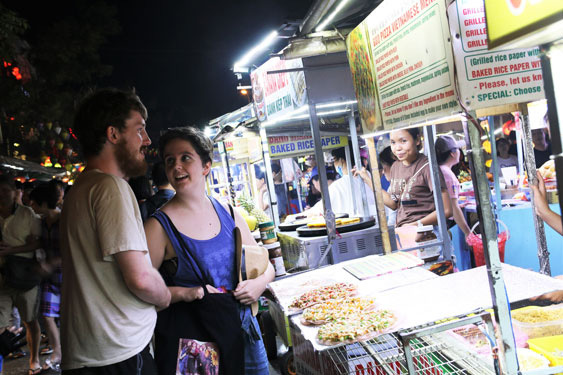Huynh Van Son, chair of Ngoi Sao Bien Sai Gon, a tourism company, told Nguoilaodong Newspaper he is very busy these days planning to open Grand World Night Market on Phu Quoc Island in Kien Giang province by year end.

The project is very promising, following the success of Phu Quoc Night Market. Son believes it will make a great contribution to the local economic development in the post-Covid-19 period.
The night-time economy concept became better known in Vietnam after the Prime Minister assigned the Ministry of Planning and Investment (MPI) to build a plan to develop a night-time economy.
The ministry thinks that such an economy, to some extent, has already been developed in Vietnam under different manifestations, from night walking streets, shopping areas, food areas, night markets, bars and street entertainment activities.
Hanoi kicked off night-time economic activities five years ago in old residential quarters. On September 1, 2016, the municipal authorities launched a walking space in Hoan Kiem Lake and neighboring areas.
| To facilitate night services in old residential quarters, the shops there are allowed to open until 2 am, while night markets are opened on three last days of week. Cultural and art performances are also allowed to be organized on three days. |
To facilitate night services in old residential quarters, the shops there are allowed to open until 2 am, while night markets are opened on three last days of week. Cultural and art performances are also allowed to be organized on three days.
The central province of Quang Binh is designing night tourism products, including a tour to discover Dong Hoi City with trams (there are more than 100 trams), the Dong Hoi Night Market, and night entertainment services in Phong Nha – Ke Bang area.
Meanwhile, Hue City is running the ‘Sang va Song’ (light and life) project which aims to provide more night services to travelers and locals.
However, as commented by MPI, night-time economic activities are just carried out on a small scale and in only some urban areas and tourism centers such as Hanoi, HCM City, Da Nang, Hoi An ancient town and Hue.
Nguyen Thi Le Thanh, deputy director of Khanh Hoa provincial Tourism Department, told Nguoilaodong that night-time economic activities in localities are just usually single activities organized by some tourism companies.
She admitted that in 2019, Nha Trang City received 7.2 million travelers, including 3 million foreigners, but the travelers mostly spent money on food and daytime entertainment services.
Duong Phu Nam, CEO of Sun World, cited a recommendation of the World Bank in 2019 that Vietnam needs to develop a sustainable tourism ecosystem, which comprises a night-time economy.
“We receive big amounts of foreign travelers, but if we cannot do this well, travelers won’t be willing to spend money,” he said.
|
Ha Long city boasts advantages in developing night-time economy With the necessary infrastructure, attractive tour packages, and high-quality shopping services, Ha Long city in the northeastern province of Quang Ninh possesses a host of advantages to develop its night-time economy, especially tourism. Over the next five years the night-time economy will be a focus of the city’s development goals and is expected to thrive. Vice Chairman of the municipal People’s Committee Nguyen Ngoc Son said that over the past five years, 6-10 million travelers have visited Ha Long each year. It welcomed 11.9 million holidaymakers last year, 30%-35% of whom were foreigners, mainly from Europe. Local authorities plan to develop dance clubs, karaoke lounges, cinemas, exhibition spaces, arts performances, and casinos at night, as well as promote sightseeing tours around the city. Shopping centres, convenience stores, and restaurants will be open later at night to serve customers. |
Le Ha

How can VN night-time economy develop?
Food and Music of An Bang Sea, a night event organized on An Bang Beach in Hoi An City in Quang Nam province last weekend, attracted many visitors.

Vietnam to develop night-time economy
Prime Minister Nguyen Xuan Phuc has approved a project to develop the night-time economy in Viet Nam to allow some activities to run overnight until 6am of the next day in some major tourism cities and zones.
